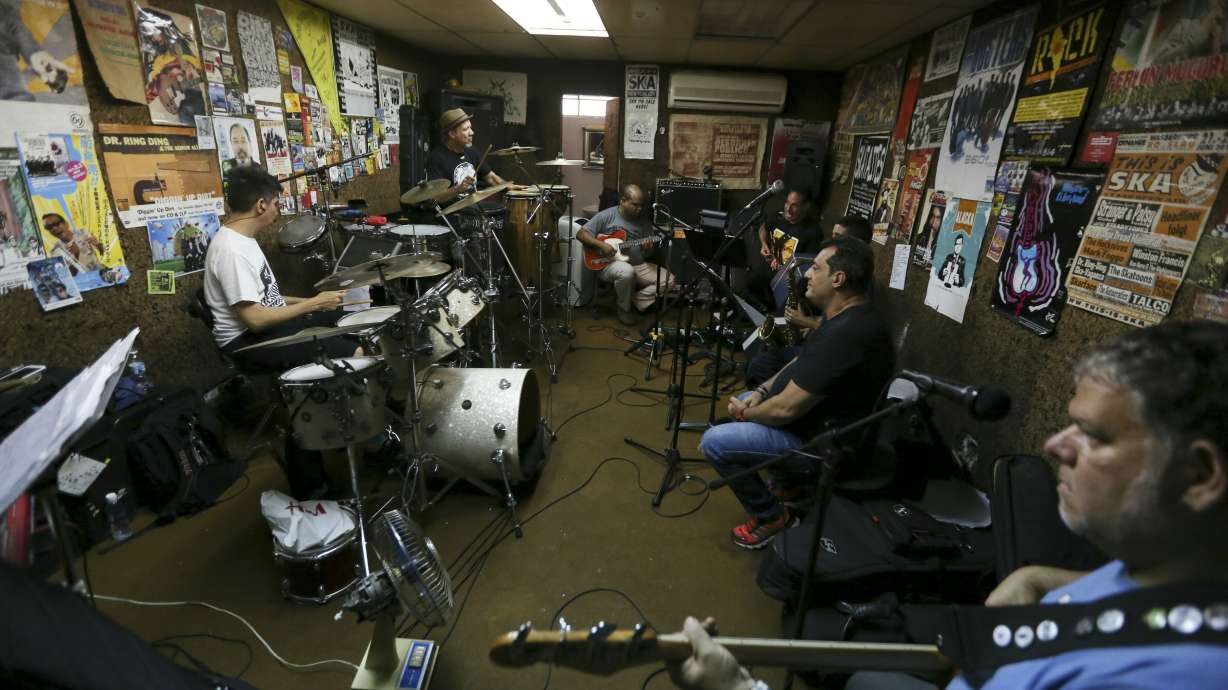Estimated read time: 4-5 minutes
This archived news story is available only for your personal, non-commercial use. Information in the story may be outdated or superseded by additional information. Reading or replaying the story in its archived form does not constitute a republication of the story.
CARACAS, Venezuela (AP) — Jammed into a small studio, Venezuelan ska band Desorden Público rehearsed "One Step Beyond" and other tunes ahead of an American tour. Percussionist Oscar Alcaíno, 60, wore a porkpie hat, a sartorial signature of ska. The cork-lined walls carried old music posters: Dr. Ring Ding, Rubén Blades, Tokyo Ska Paradise Orchestra, Joe Strummer 1952-2002.
Founded in 1985, Desorden Público writes blistering lyrics that feed off Venezuela's desperation today. The band satirizes corruption and dysfunction in a nation it loves and laments. It does so to high-energy ska, an evolving musical style that started in Jamaica and enjoyed a revival in Britain around 1980.
"We're a country that has many reasons to get upset, many reasons to shout out, to protest," 50-year-old Horacio Blanco, lead singer and guitarist, said in an interview with The Associated Press. "But there are also reasons to show that we have joy running through our veins."
They show that joy, or try to, in a country shattered by economic freefall and political conflict. In March, nationwide blackouts knocked out power in the group's recording studio. The musicians send audio files via often unreliable internet. A Desorden Público concert in the Venezuelan city of Valencia was cancelled because of highway security concerns. Band expenses rise. Fans spend scarce cash on food and medicine.
The group says it faces censorship because broadcasters drop songs that skewer the powerful. As Venezuela's art and entertainment scene shrinks, musicians perform in smaller venues or, like many compatriots, leave the country.
"If you're going to carry on stealing from us, at least change the thieves," is a line from the sarcastically titled song "Todo Está Muy Normal" (Everything is Very Normal). The song includes old audio of Venezuelan President Nicolás Maduro, now locked in a contest for power with the U.S.-backed opposition, praising the group for its anti-graft message — an irony for Venezuelans who consider him as corrupt as any of his predecessors.
Desorden Público's profile is lower than in the past but "they still have their followers," said Mirla Moros, a Caracas resident. She said she's not a dedicated fan, but: "If I have the opportunity to see them, I'll go."
Radio host Jesús Leandro said Desorden Público is "very active," especially considering Venezuela's dire circumstances, and international fans are key. Some in the growing, homesick diaspora buoy the group. It collaborated with another band, C4 Trio, for a 2018 Grammy nomination for best Latin rock, urban or alternative album.
The band has a few gigs in Florida this week on a 16-concert tour that ends July 7 in Chicago. It celebrates the 25th anniversary of its album "Canto Popular de la Vida y Muerte," whose planned reissue this year includes collaborations with musicians in other countries.
"In our country's time of crisis, it's incredible that we're making probably the most elaborate album of our career," said José Luis Chacín, the 54-year-old bassist.
The band's fourth core member, with Alcaino, Blanco and Chacin, is 55-year-old drummer Danel Sarmiento, who cultivates a curled, Salvador Dali-style moustache.
The name of the band pokes fun at the 1980s-era "public order" vans of Venezuelan security forces. Desorden Público gets inspiration from Britain's Specials, the ska band that found success this year with the album "Encore," decades after hits including "Ghost Town" in 1981.
The Venezuelan ska band prepared an introductory monologue for its song "Los Zombis Están de Moda" (Zombies are in Fashion), in which blackouts cut off water and communications. Chaos takes over. Blanco intones: "The people who lived there started to turn into zombies."
"Los Que Se Quedan, Los Que Se Van," (Those Who Stay, Those who Leave) is a melancholic Desorden Público song about the millions of Venezuelans who left their homeland over the years.
"There isn't a Venezuelan who isn't very close to that drama," Blanco said. "Because he left, because he's about to leave, because he returned, because his mother left, his uncle, his cousin, his sister, his girlfriend, his colleague, his neighbor, his friend."
But Venezuela's rude boys, as ska aficionados are sometimes known, still have fun.
"In spite of everything, we're still here," Alcaíno said. "Optimistic."
___
Follow Christopher Torchia on Twitter at www.twitter.com/torchiachris
Copyright © The Associated Press. All rights reserved. This material may not be published, broadcast, rewritten or redistributed.








